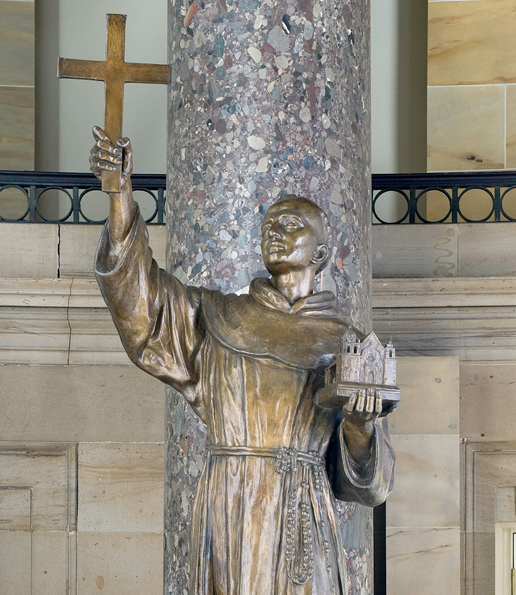California’s Plan to Deport our Heritage

*The recognition of Father Junipero Serra in the U.S. Capitol’s Statuary Hall, as well as Pope Francis’ plan to canonize the 18th century friar, have been the center of recent discussion and controversy. Native American groups oppose the statue and the canonization, saying Serra committed genocide against native communities. NewsTaco has published several news reports and a commentary about the controversy and about how the California state legislature voted to remove Serra’s statue from the Capitol hall. This commentary is in support of both the statue and the canonization. VL
By Alejandro Bermudez, Special to NewsTaco
Statuary Hall at the Capitol is a place filled with familiar names: Samuel Adams, Ethan Allen, Stephen Austin, Daniel Webster, and the list goes on. In that revered space, each state has the opportunity to honor two people with statues.
Despite the fact that John C. Calhoun and Jefferson Davis still have a place in Statuary Hall, there are few ethnic names, and only two of them are Hispanic –Junipero Serra.
Junipero Serra is not just “California’s Founding Father,” – as one historian has called him – he is the most notable Hispanic founding Father of what is now United States. He toiled tirelessly for the rights of the Native Californians, and he symbolizes the multicultural and tolerant attitude that California aspires to today.
Now something unbelievable is happening. In a state that counts Hispanics as its largest ethnic group, California’s elected leaders are about to banish the first and one of the only two Hispanic from statuary hall.
On April 13, the California state Senate voted 22 to 10 to replace Serra’s statue with a statue of astronaut Sally Ride, the first American woman in space.
To add insult to injury, they plan to go on the record with this just in time to welcome the first Latin American pope in history to the United States. It’s quite the insult to the Pope, who will visit the Capitol and canonize Serra during his September visit –making him the first saint to be named by a pope on American soil.
The state senate could be the catalyst – one hopes unwittingly – for the elimination of Hispanic representation among the statues of our country’s heroes.
The bill to push Serra out of the Capitol’s service entrance now moves to the Assembly, where we can only hope that cooler heads will prevail, and a travesty will be averted.
For the 54 million Hispanics in the United States, many of whom like Serra know what it is to work without recognition – as Serra often did – the connotation of such a gesture would be painful. It would prove a stark reminder of just how far the Hispanic community still has to come to fully secure their rightful place in American history.
I am disappointed by this literal – if unintentional – whitewashing of California history, but perhaps I should not be surprised by it.
Andrew Jackson, who famously forced Indians onto the “trail of tears” will still have a statue there, but Serra, who tried to protect the Native Californians from the excesses and abuses of colonization, will not.
It’s really shocking, but it says something about how history is taught in America that this could happen to a Hispanic Catholic hero.
Anti-Hispanic and anti-Catholic prejudice have a long and deeply rooted legacy here.
Our history books are filled with stories about how terrible the Catholic Spanish were.
Ironically, in the process of the European colonization of the Americas, Spain was the only colonial power to pass laws for the protection of Native Americans.
Still, those other countries – jealous of Spanish achievement – promoted the “black legend” characterizing Hispanics as lazy, cruel, and inferior.
Hispanic-Americans still suffer the consequences of that sordid rewriting of history, and too often face similar stereotypes in their own lives – and even in Hollywood and in the media. Little wonder that there are still some who speak of mass deportations of Hispanics with a straight face, and think they are doing this country a service.
And what message will we send when we deport Serra from our country’s Capitol?
The “black legend’s” negative narrative has seeped so deeply into our culture that it has caused many Hispanics to feel conflicted about their heritage. Perhaps that false narrative and the confusion it creates explain why even some Hispanic politicians can champion such a defeat for our culture.
As a Hispanic immigrant myself, I see Junipero Serra as a representation of the culture which I and millions of others hold so dear.
We need to reclaim our heritage from the “black legend” – instead of letting it drive us to further diminish the Hispanic and Catholic contribution to American history.
I cannot say that I am surprised by the California Senate’s ill-conceived effort that could make Statuary Hall into a Hispanic-free zone. But I am deeply pained by what many of us will see as yet another consequence and reinforcement of the “black legend,” and thus a setback for Hispanics in the United States and beyond.
With the U.S. visit of Pope Francis, Hispanics throughout the United States have yet another reason to take pride in their culture.
This is not the time to trash our heritage. It is the time to embrace it.
Alejandro Bermudez is a Peruvian immigrant to the United States. He is the author of a book on the pope, “Francis: Our Brother, Our Friend”, and is the producer of the documentary “Francis: The Pope from the New World”. He is also the translator of the pope’s book “On Heaven and Earth”.

